ESBM Report: Entrepreneurship Ventures, Micro-Businesses and Economy
VerifiedAdded on 2023/01/10
|21
|5981
|66
Report
AI Summary
This report provides a comprehensive overview of entrepreneurship, examining various entrepreneurial ventures, including micro, small, and large businesses, and their typologies. It explores the similarities and differences between these ventures, highlighting their diverse characteristics and operational scopes. The report delves into the impact of micro and small businesses on the UK economy, supported by statistical data on business population, employment, and turnover across different sectors. Furthermore, it emphasizes the significance of small businesses and start-ups in fostering social economy growth. The report also investigates the characteristic traits and skills that distinguish successful entrepreneurs from business managers, alongside an analysis of entrepreneurial personality, motivation, and mindset. Finally, it considers the factors that hinder and foster entrepreneurship, providing a holistic understanding of the entrepreneurial landscape and its societal contributions.

ESBM
Paraphrase This Document
Need a fresh take? Get an instant paraphrase of this document with our AI Paraphraser
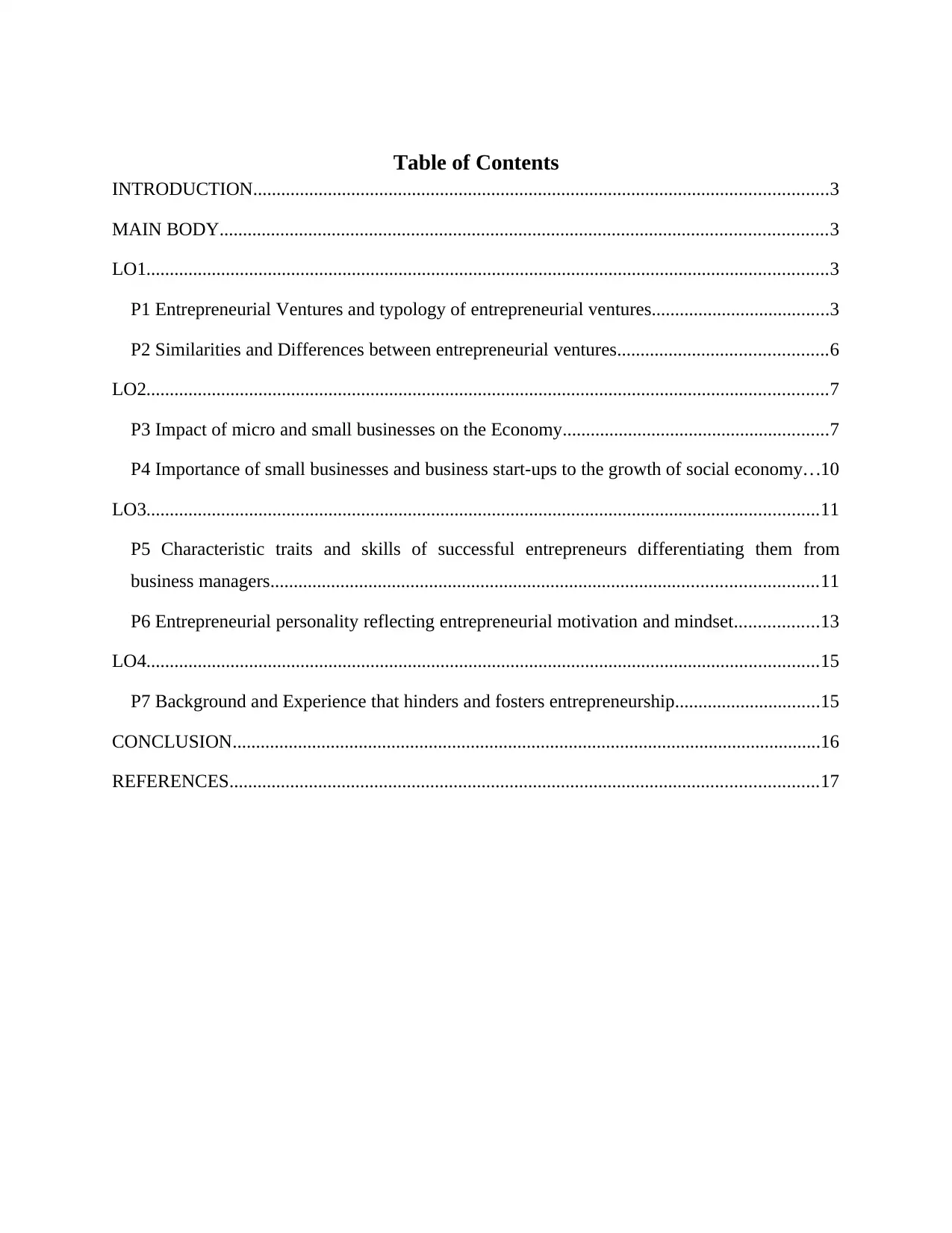
Table of Contents
INTRODUCTION...........................................................................................................................3
MAIN BODY..................................................................................................................................3
LO1..................................................................................................................................................3
P1 Entrepreneurial Ventures and typology of entrepreneurial ventures......................................3
P2 Similarities and Differences between entrepreneurial ventures.............................................6
LO2..................................................................................................................................................7
P3 Impact of micro and small businesses on the Economy.........................................................7
P4 Importance of small businesses and business start-ups to the growth of social economy...10
LO3................................................................................................................................................11
P5 Characteristic traits and skills of successful entrepreneurs differentiating them from
business managers.....................................................................................................................11
P6 Entrepreneurial personality reflecting entrepreneurial motivation and mindset..................13
LO4................................................................................................................................................15
P7 Background and Experience that hinders and fosters entrepreneurship...............................15
CONCLUSION..............................................................................................................................16
REFERENCES..............................................................................................................................17
INTRODUCTION...........................................................................................................................3
MAIN BODY..................................................................................................................................3
LO1..................................................................................................................................................3
P1 Entrepreneurial Ventures and typology of entrepreneurial ventures......................................3
P2 Similarities and Differences between entrepreneurial ventures.............................................6
LO2..................................................................................................................................................7
P3 Impact of micro and small businesses on the Economy.........................................................7
P4 Importance of small businesses and business start-ups to the growth of social economy...10
LO3................................................................................................................................................11
P5 Characteristic traits and skills of successful entrepreneurs differentiating them from
business managers.....................................................................................................................11
P6 Entrepreneurial personality reflecting entrepreneurial motivation and mindset..................13
LO4................................................................................................................................................15
P7 Background and Experience that hinders and fosters entrepreneurship...............................15
CONCLUSION..............................................................................................................................16
REFERENCES..............................................................................................................................17
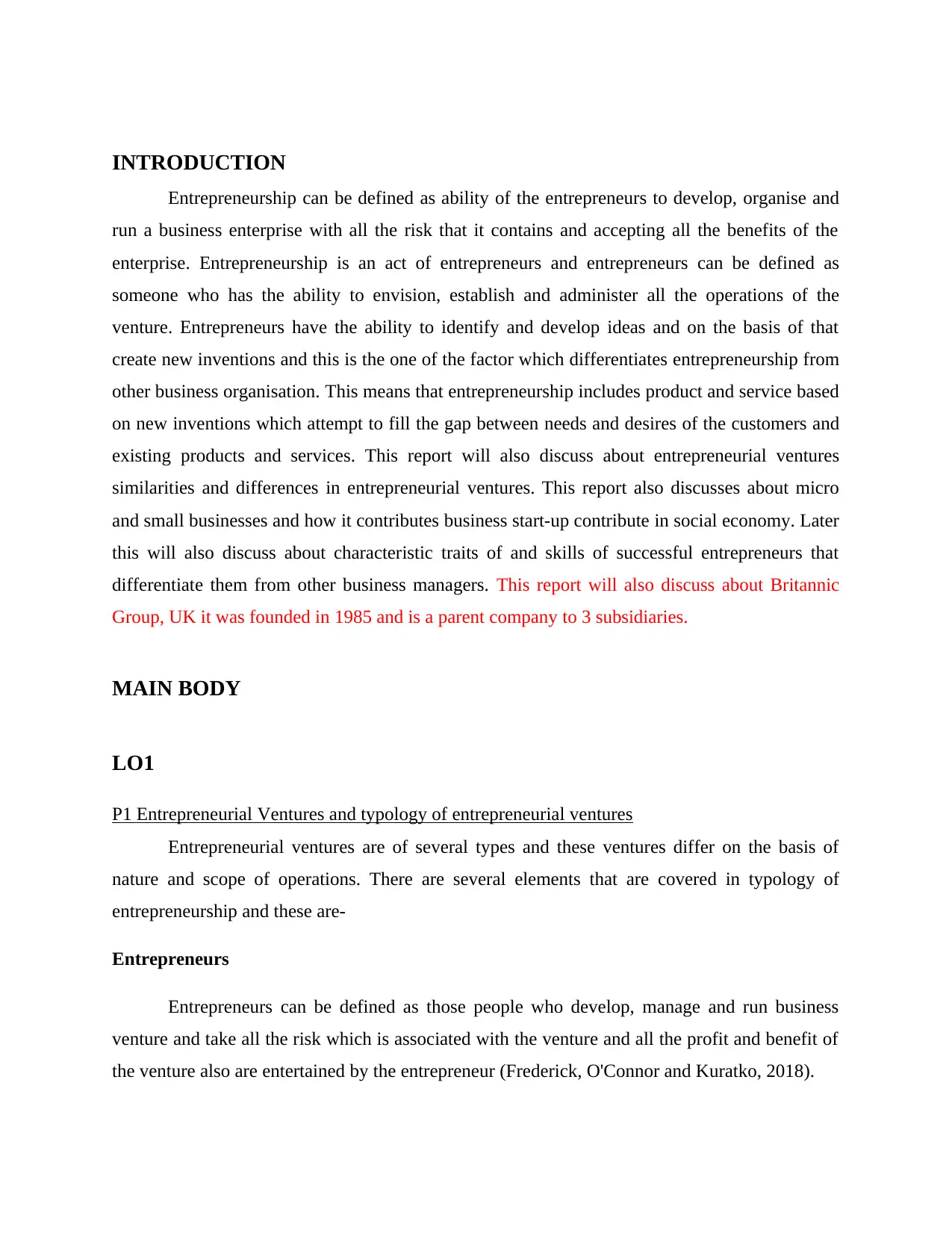
INTRODUCTION
Entrepreneurship can be defined as ability of the entrepreneurs to develop, organise and
run a business enterprise with all the risk that it contains and accepting all the benefits of the
enterprise. Entrepreneurship is an act of entrepreneurs and entrepreneurs can be defined as
someone who has the ability to envision, establish and administer all the operations of the
venture. Entrepreneurs have the ability to identify and develop ideas and on the basis of that
create new inventions and this is the one of the factor which differentiates entrepreneurship from
other business organisation. This means that entrepreneurship includes product and service based
on new inventions which attempt to fill the gap between needs and desires of the customers and
existing products and services. This report will also discuss about entrepreneurial ventures
similarities and differences in entrepreneurial ventures. This report also discusses about micro
and small businesses and how it contributes business start-up contribute in social economy. Later
this will also discuss about characteristic traits of and skills of successful entrepreneurs that
differentiate them from other business managers. This report will also discuss about Britannic
Group, UK it was founded in 1985 and is a parent company to 3 subsidiaries.
MAIN BODY
LO1
P1 Entrepreneurial Ventures and typology of entrepreneurial ventures
Entrepreneurial ventures are of several types and these ventures differ on the basis of
nature and scope of operations. There are several elements that are covered in typology of
entrepreneurship and these are-
Entrepreneurs
Entrepreneurs can be defined as those people who develop, manage and run business
venture and take all the risk which is associated with the venture and all the profit and benefit of
the venture also are entertained by the entrepreneur (Frederick, O'Connor and Kuratko, 2018).
Entrepreneurship can be defined as ability of the entrepreneurs to develop, organise and
run a business enterprise with all the risk that it contains and accepting all the benefits of the
enterprise. Entrepreneurship is an act of entrepreneurs and entrepreneurs can be defined as
someone who has the ability to envision, establish and administer all the operations of the
venture. Entrepreneurs have the ability to identify and develop ideas and on the basis of that
create new inventions and this is the one of the factor which differentiates entrepreneurship from
other business organisation. This means that entrepreneurship includes product and service based
on new inventions which attempt to fill the gap between needs and desires of the customers and
existing products and services. This report will also discuss about entrepreneurial ventures
similarities and differences in entrepreneurial ventures. This report also discusses about micro
and small businesses and how it contributes business start-up contribute in social economy. Later
this will also discuss about characteristic traits of and skills of successful entrepreneurs that
differentiate them from other business managers. This report will also discuss about Britannic
Group, UK it was founded in 1985 and is a parent company to 3 subsidiaries.
MAIN BODY
LO1
P1 Entrepreneurial Ventures and typology of entrepreneurial ventures
Entrepreneurial ventures are of several types and these ventures differ on the basis of
nature and scope of operations. There are several elements that are covered in typology of
entrepreneurship and these are-
Entrepreneurs
Entrepreneurs can be defined as those people who develop, manage and run business
venture and take all the risk which is associated with the venture and all the profit and benefit of
the venture also are entertained by the entrepreneur (Frederick, O'Connor and Kuratko, 2018).
⊘ This is a preview!⊘
Do you want full access?
Subscribe today to unlock all pages.

Trusted by 1+ million students worldwide
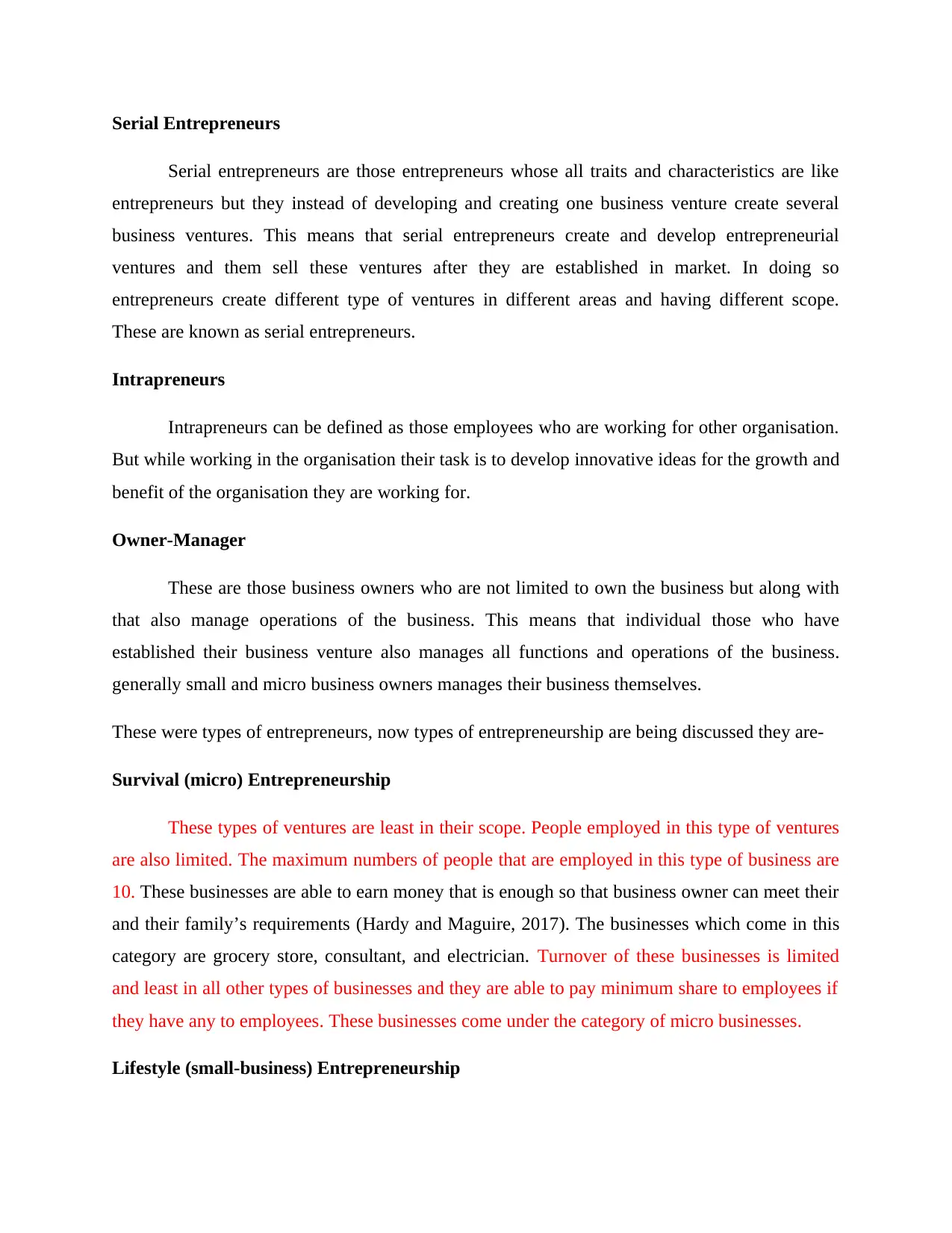
Serial Entrepreneurs
Serial entrepreneurs are those entrepreneurs whose all traits and characteristics are like
entrepreneurs but they instead of developing and creating one business venture create several
business ventures. This means that serial entrepreneurs create and develop entrepreneurial
ventures and them sell these ventures after they are established in market. In doing so
entrepreneurs create different type of ventures in different areas and having different scope.
These are known as serial entrepreneurs.
Intrapreneurs
Intrapreneurs can be defined as those employees who are working for other organisation.
But while working in the organisation their task is to develop innovative ideas for the growth and
benefit of the organisation they are working for.
Owner-Manager
These are those business owners who are not limited to own the business but along with
that also manage operations of the business. This means that individual those who have
established their business venture also manages all functions and operations of the business.
generally small and micro business owners manages their business themselves.
These were types of entrepreneurs, now types of entrepreneurship are being discussed they are-
Survival (micro) Entrepreneurship
These types of ventures are least in their scope. People employed in this type of ventures
are also limited. The maximum numbers of people that are employed in this type of business are
10. These businesses are able to earn money that is enough so that business owner can meet their
and their family’s requirements (Hardy and Maguire, 2017). The businesses which come in this
category are grocery store, consultant, and electrician. Turnover of these businesses is limited
and least in all other types of businesses and they are able to pay minimum share to employees if
they have any to employees. These businesses come under the category of micro businesses.
Lifestyle (small-business) Entrepreneurship
Serial entrepreneurs are those entrepreneurs whose all traits and characteristics are like
entrepreneurs but they instead of developing and creating one business venture create several
business ventures. This means that serial entrepreneurs create and develop entrepreneurial
ventures and them sell these ventures after they are established in market. In doing so
entrepreneurs create different type of ventures in different areas and having different scope.
These are known as serial entrepreneurs.
Intrapreneurs
Intrapreneurs can be defined as those employees who are working for other organisation.
But while working in the organisation their task is to develop innovative ideas for the growth and
benefit of the organisation they are working for.
Owner-Manager
These are those business owners who are not limited to own the business but along with
that also manage operations of the business. This means that individual those who have
established their business venture also manages all functions and operations of the business.
generally small and micro business owners manages their business themselves.
These were types of entrepreneurs, now types of entrepreneurship are being discussed they are-
Survival (micro) Entrepreneurship
These types of ventures are least in their scope. People employed in this type of ventures
are also limited. The maximum numbers of people that are employed in this type of business are
10. These businesses are able to earn money that is enough so that business owner can meet their
and their family’s requirements (Hardy and Maguire, 2017). The businesses which come in this
category are grocery store, consultant, and electrician. Turnover of these businesses is limited
and least in all other types of businesses and they are able to pay minimum share to employees if
they have any to employees. These businesses come under the category of micro businesses.
Lifestyle (small-business) Entrepreneurship
Paraphrase This Document
Need a fresh take? Get an instant paraphrase of this document with our AI Paraphraser
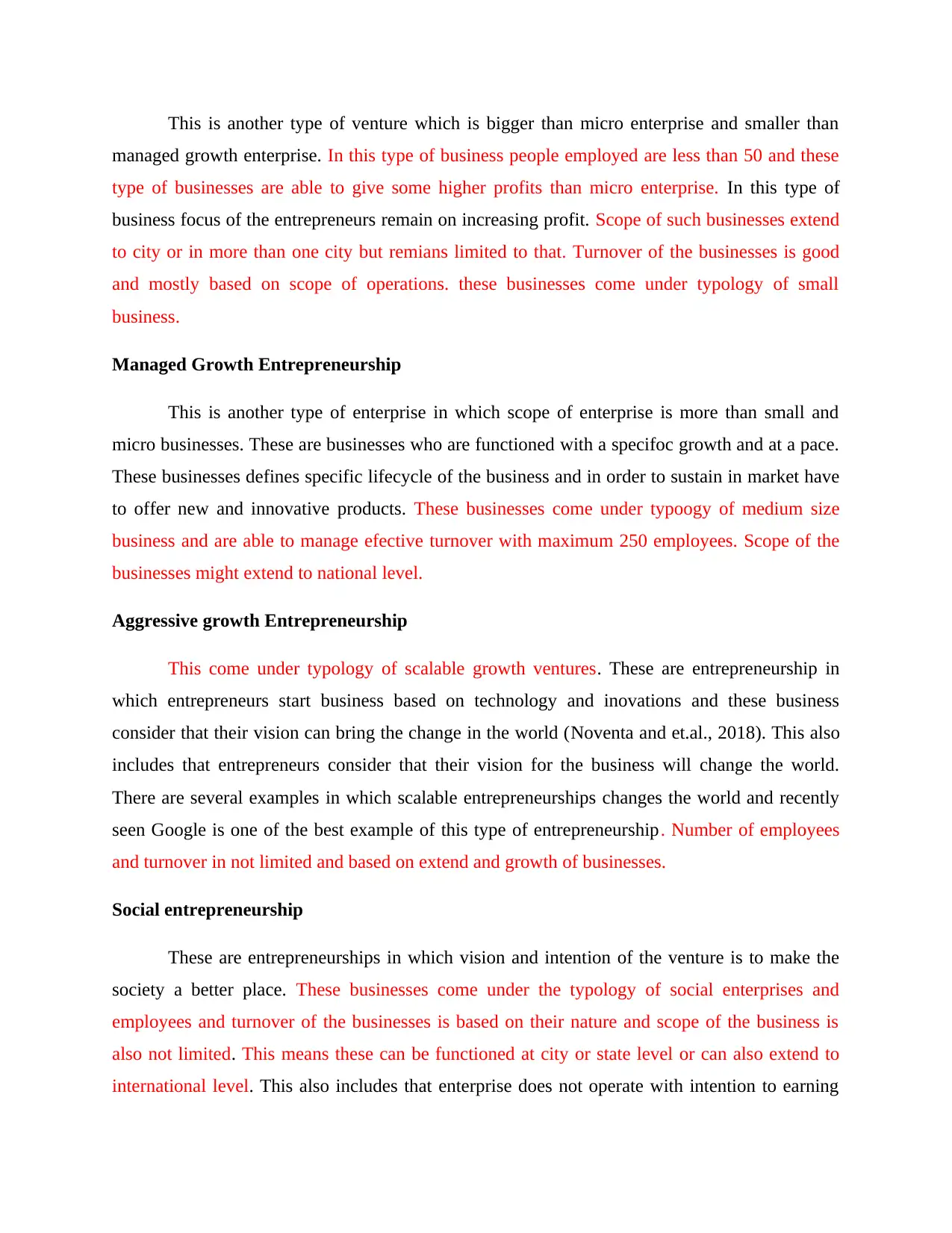
This is another type of venture which is bigger than micro enterprise and smaller than
managed growth enterprise. In this type of business people employed are less than 50 and these
type of businesses are able to give some higher profits than micro enterprise. In this type of
business focus of the entrepreneurs remain on increasing profit. Scope of such businesses extend
to city or in more than one city but remians limited to that. Turnover of the businesses is good
and mostly based on scope of operations. these businesses come under typology of small
business.
Managed Growth Entrepreneurship
This is another type of enterprise in which scope of enterprise is more than small and
micro businesses. These are businesses who are functioned with a specifoc growth and at a pace.
These businesses defines specific lifecycle of the business and in order to sustain in market have
to offer new and innovative products. These businesses come under typoogy of medium size
business and are able to manage efective turnover with maximum 250 employees. Scope of the
businesses might extend to national level.
Aggressive growth Entrepreneurship
This come under typology of scalable growth ventures. These are entrepreneurship in
which entrepreneurs start business based on technology and inovations and these business
consider that their vision can bring the change in the world (Noventa and et.al., 2018). This also
includes that entrepreneurs consider that their vision for the business will change the world.
There are several examples in which scalable entrepreneurships changes the world and recently
seen Google is one of the best example of this type of entrepreneurship. Number of employees
and turnover in not limited and based on extend and growth of businesses.
Social entrepreneurship
These are entrepreneurships in which vision and intention of the venture is to make the
society a better place. These businesses come under the typology of social enterprises and
employees and turnover of the businesses is based on their nature and scope of the business is
also not limited. This means these can be functioned at city or state level or can also extend to
international level. This also includes that enterprise does not operate with intention to earning
managed growth enterprise. In this type of business people employed are less than 50 and these
type of businesses are able to give some higher profits than micro enterprise. In this type of
business focus of the entrepreneurs remain on increasing profit. Scope of such businesses extend
to city or in more than one city but remians limited to that. Turnover of the businesses is good
and mostly based on scope of operations. these businesses come under typology of small
business.
Managed Growth Entrepreneurship
This is another type of enterprise in which scope of enterprise is more than small and
micro businesses. These are businesses who are functioned with a specifoc growth and at a pace.
These businesses defines specific lifecycle of the business and in order to sustain in market have
to offer new and innovative products. These businesses come under typoogy of medium size
business and are able to manage efective turnover with maximum 250 employees. Scope of the
businesses might extend to national level.
Aggressive growth Entrepreneurship
This come under typology of scalable growth ventures. These are entrepreneurship in
which entrepreneurs start business based on technology and inovations and these business
consider that their vision can bring the change in the world (Noventa and et.al., 2018). This also
includes that entrepreneurs consider that their vision for the business will change the world.
There are several examples in which scalable entrepreneurships changes the world and recently
seen Google is one of the best example of this type of entrepreneurship. Number of employees
and turnover in not limited and based on extend and growth of businesses.
Social entrepreneurship
These are entrepreneurships in which vision and intention of the venture is to make the
society a better place. These businesses come under the typology of social enterprises and
employees and turnover of the businesses is based on their nature and scope of the business is
also not limited. This means these can be functioned at city or state level or can also extend to
international level. This also includes that enterprise does not operate with intention to earning
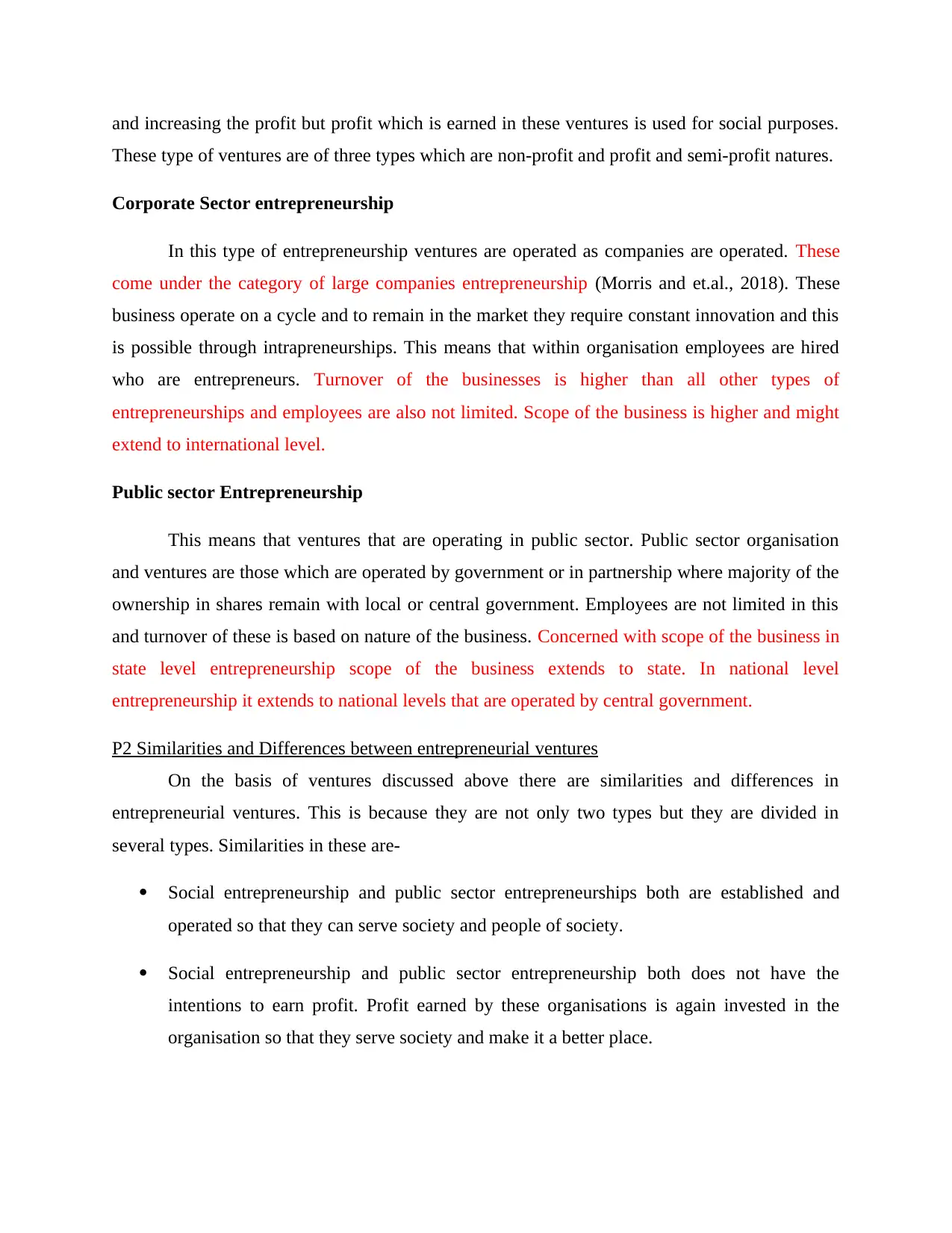
and increasing the profit but profit which is earned in these ventures is used for social purposes.
These type of ventures are of three types which are non-profit and profit and semi-profit natures.
Corporate Sector entrepreneurship
In this type of entrepreneurship ventures are operated as companies are operated. These
come under the category of large companies entrepreneurship (Morris and et.al., 2018). These
business operate on a cycle and to remain in the market they require constant innovation and this
is possible through intrapreneurships. This means that within organisation employees are hired
who are entrepreneurs. Turnover of the businesses is higher than all other types of
entrepreneurships and employees are also not limited. Scope of the business is higher and might
extend to international level.
Public sector Entrepreneurship
This means that ventures that are operating in public sector. Public sector organisation
and ventures are those which are operated by government or in partnership where majority of the
ownership in shares remain with local or central government. Employees are not limited in this
and turnover of these is based on nature of the business. Concerned with scope of the business in
state level entrepreneurship scope of the business extends to state. In national level
entrepreneurship it extends to national levels that are operated by central government.
P2 Similarities and Differences between entrepreneurial ventures
On the basis of ventures discussed above there are similarities and differences in
entrepreneurial ventures. This is because they are not only two types but they are divided in
several types. Similarities in these are-
Social entrepreneurship and public sector entrepreneurships both are established and
operated so that they can serve society and people of society.
Social entrepreneurship and public sector entrepreneurship both does not have the
intentions to earn profit. Profit earned by these organisations is again invested in the
organisation so that they serve society and make it a better place.
These type of ventures are of three types which are non-profit and profit and semi-profit natures.
Corporate Sector entrepreneurship
In this type of entrepreneurship ventures are operated as companies are operated. These
come under the category of large companies entrepreneurship (Morris and et.al., 2018). These
business operate on a cycle and to remain in the market they require constant innovation and this
is possible through intrapreneurships. This means that within organisation employees are hired
who are entrepreneurs. Turnover of the businesses is higher than all other types of
entrepreneurships and employees are also not limited. Scope of the business is higher and might
extend to international level.
Public sector Entrepreneurship
This means that ventures that are operating in public sector. Public sector organisation
and ventures are those which are operated by government or in partnership where majority of the
ownership in shares remain with local or central government. Employees are not limited in this
and turnover of these is based on nature of the business. Concerned with scope of the business in
state level entrepreneurship scope of the business extends to state. In national level
entrepreneurship it extends to national levels that are operated by central government.
P2 Similarities and Differences between entrepreneurial ventures
On the basis of ventures discussed above there are similarities and differences in
entrepreneurial ventures. This is because they are not only two types but they are divided in
several types. Similarities in these are-
Social entrepreneurship and public sector entrepreneurships both are established and
operated so that they can serve society and people of society.
Social entrepreneurship and public sector entrepreneurship both does not have the
intentions to earn profit. Profit earned by these organisations is again invested in the
organisation so that they serve society and make it a better place.
⊘ This is a preview!⊘
Do you want full access?
Subscribe today to unlock all pages.

Trusted by 1+ million students worldwide
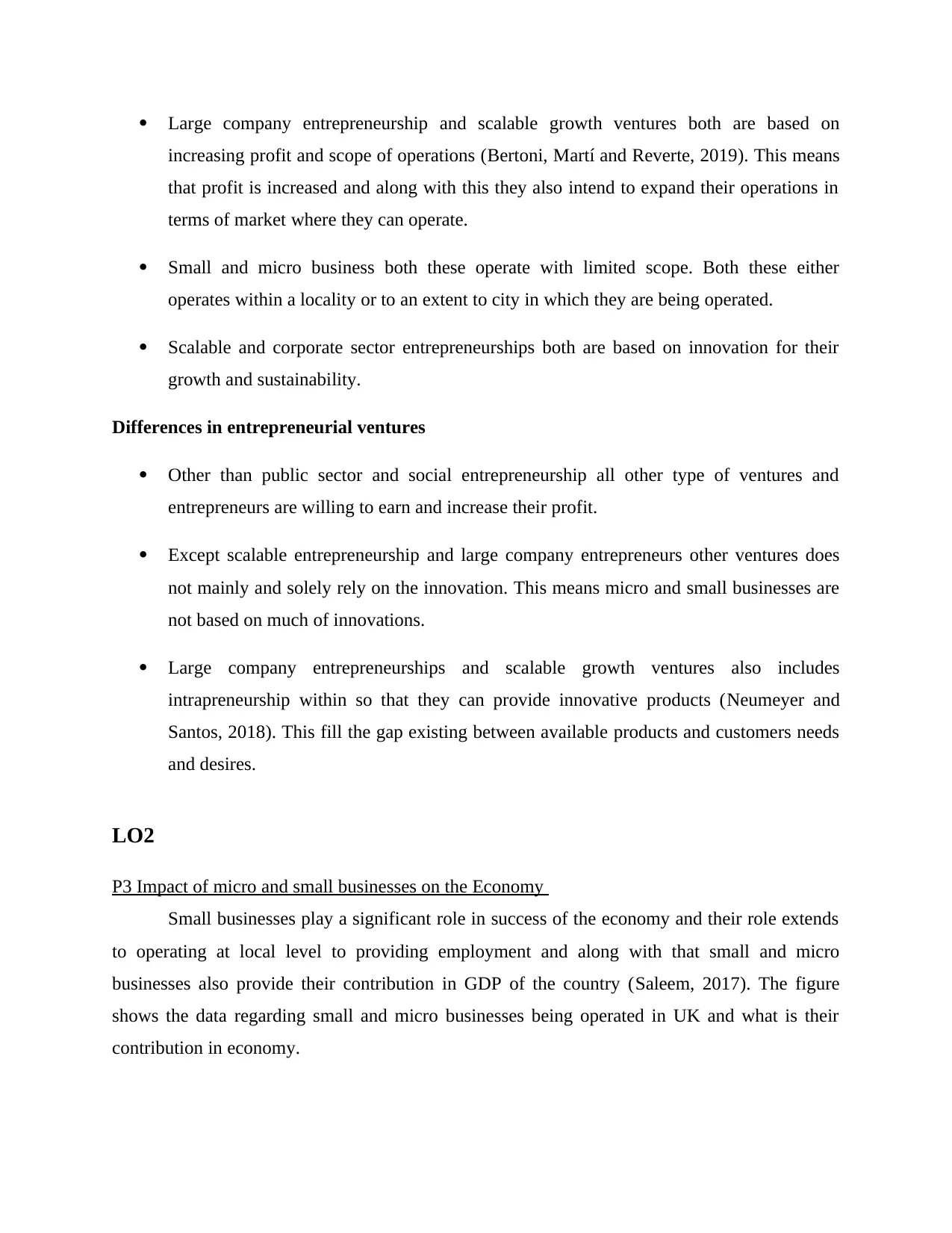
Large company entrepreneurship and scalable growth ventures both are based on
increasing profit and scope of operations (Bertoni, Martí and Reverte, 2019). This means
that profit is increased and along with this they also intend to expand their operations in
terms of market where they can operate.
Small and micro business both these operate with limited scope. Both these either
operates within a locality or to an extent to city in which they are being operated.
Scalable and corporate sector entrepreneurships both are based on innovation for their
growth and sustainability.
Differences in entrepreneurial ventures
Other than public sector and social entrepreneurship all other type of ventures and
entrepreneurs are willing to earn and increase their profit.
Except scalable entrepreneurship and large company entrepreneurs other ventures does
not mainly and solely rely on the innovation. This means micro and small businesses are
not based on much of innovations.
Large company entrepreneurships and scalable growth ventures also includes
intrapreneurship within so that they can provide innovative products (Neumeyer and
Santos, 2018). This fill the gap existing between available products and customers needs
and desires.
LO2
P3 Impact of micro and small businesses on the Economy
Small businesses play a significant role in success of the economy and their role extends
to operating at local level to providing employment and along with that small and micro
businesses also provide their contribution in GDP of the country (Saleem, 2017). The figure
shows the data regarding small and micro businesses being operated in UK and what is their
contribution in economy.
increasing profit and scope of operations (Bertoni, Martí and Reverte, 2019). This means
that profit is increased and along with this they also intend to expand their operations in
terms of market where they can operate.
Small and micro business both these operate with limited scope. Both these either
operates within a locality or to an extent to city in which they are being operated.
Scalable and corporate sector entrepreneurships both are based on innovation for their
growth and sustainability.
Differences in entrepreneurial ventures
Other than public sector and social entrepreneurship all other type of ventures and
entrepreneurs are willing to earn and increase their profit.
Except scalable entrepreneurship and large company entrepreneurs other ventures does
not mainly and solely rely on the innovation. This means micro and small businesses are
not based on much of innovations.
Large company entrepreneurships and scalable growth ventures also includes
intrapreneurship within so that they can provide innovative products (Neumeyer and
Santos, 2018). This fill the gap existing between available products and customers needs
and desires.
LO2
P3 Impact of micro and small businesses on the Economy
Small businesses play a significant role in success of the economy and their role extends
to operating at local level to providing employment and along with that small and micro
businesses also provide their contribution in GDP of the country (Saleem, 2017). The figure
shows the data regarding small and micro businesses being operated in UK and what is their
contribution in economy.
Paraphrase This Document
Need a fresh take? Get an instant paraphrase of this document with our AI Paraphraser
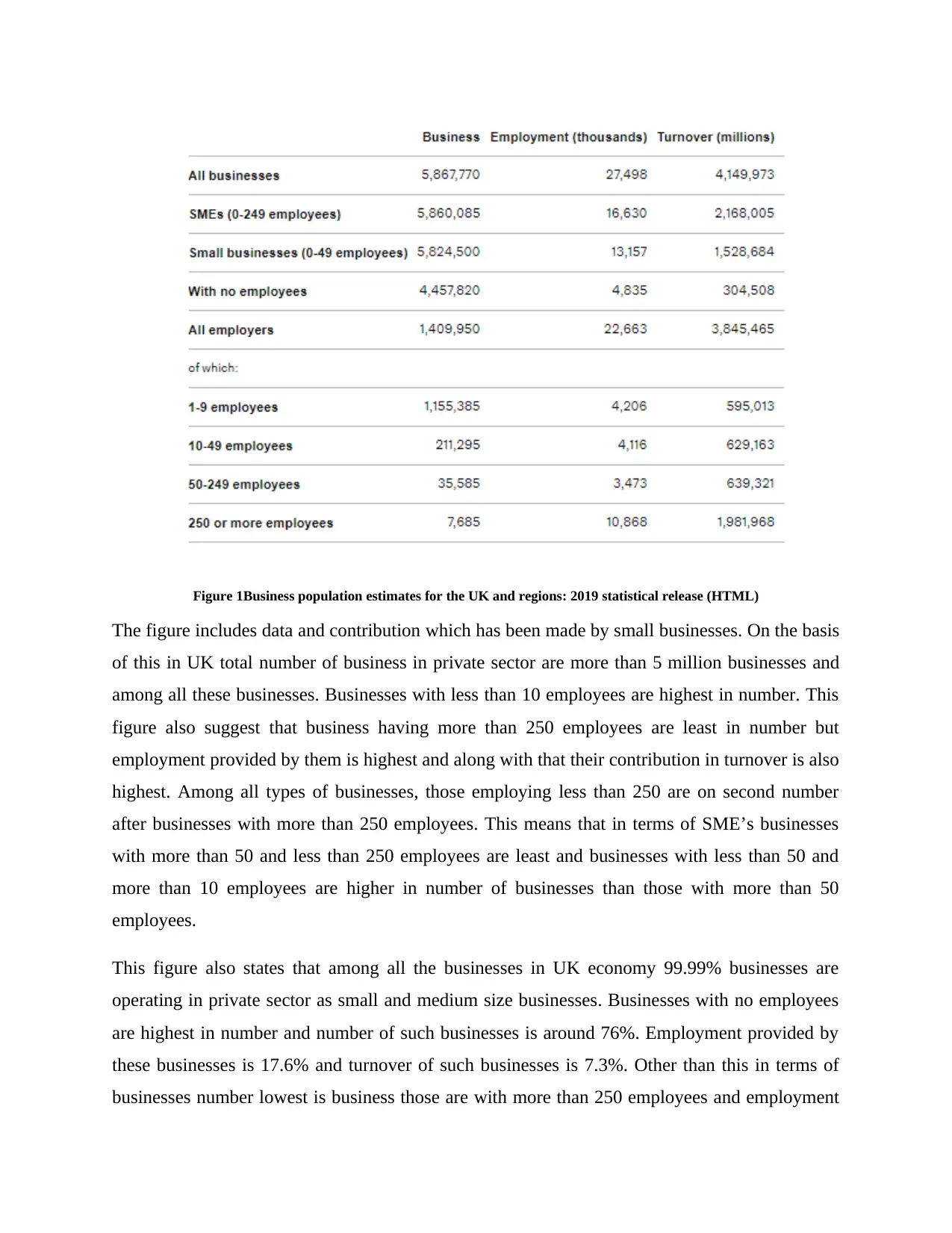
Figure 1Business population estimates for the UK and regions: 2019 statistical release (HTML)
The figure includes data and contribution which has been made by small businesses. On the basis
of this in UK total number of business in private sector are more than 5 million businesses and
among all these businesses. Businesses with less than 10 employees are highest in number. This
figure also suggest that business having more than 250 employees are least in number but
employment provided by them is highest and along with that their contribution in turnover is also
highest. Among all types of businesses, those employing less than 250 are on second number
after businesses with more than 250 employees. This means that in terms of SME’s businesses
with more than 50 and less than 250 employees are least and businesses with less than 50 and
more than 10 employees are higher in number of businesses than those with more than 50
employees.
This figure also states that among all the businesses in UK economy 99.99% businesses are
operating in private sector as small and medium size businesses. Businesses with no employees
are highest in number and number of such businesses is around 76%. Employment provided by
these businesses is 17.6% and turnover of such businesses is 7.3%. Other than this in terms of
businesses number lowest is business those are with more than 250 employees and employment
The figure includes data and contribution which has been made by small businesses. On the basis
of this in UK total number of business in private sector are more than 5 million businesses and
among all these businesses. Businesses with less than 10 employees are highest in number. This
figure also suggest that business having more than 250 employees are least in number but
employment provided by them is highest and along with that their contribution in turnover is also
highest. Among all types of businesses, those employing less than 250 are on second number
after businesses with more than 250 employees. This means that in terms of SME’s businesses
with more than 50 and less than 250 employees are least and businesses with less than 50 and
more than 10 employees are higher in number of businesses than those with more than 50
employees.
This figure also states that among all the businesses in UK economy 99.99% businesses are
operating in private sector as small and medium size businesses. Businesses with no employees
are highest in number and number of such businesses is around 76%. Employment provided by
these businesses is 17.6% and turnover of such businesses is 7.3%. Other than this in terms of
businesses number lowest is business those are with more than 250 employees and employment
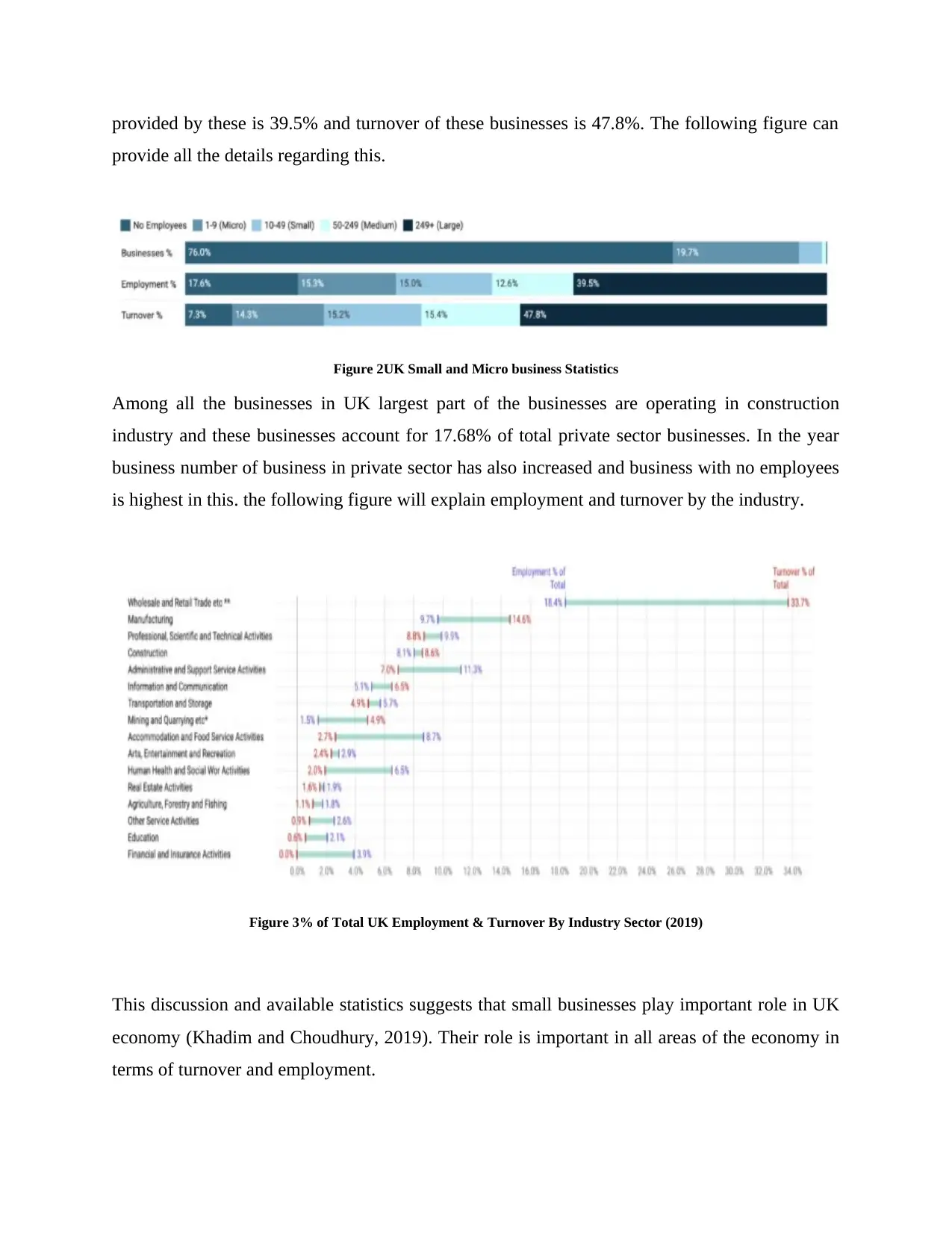
provided by these is 39.5% and turnover of these businesses is 47.8%. The following figure can
provide all the details regarding this.
Figure 2UK Small and Micro business Statistics
Among all the businesses in UK largest part of the businesses are operating in construction
industry and these businesses account for 17.68% of total private sector businesses. In the year
business number of business in private sector has also increased and business with no employees
is highest in this. the following figure will explain employment and turnover by the industry.
Figure 3% of Total UK Employment & Turnover By Industry Sector (2019)
This discussion and available statistics suggests that small businesses play important role in UK
economy (Khadim and Choudhury, 2019). Their role is important in all areas of the economy in
terms of turnover and employment.
provide all the details regarding this.
Figure 2UK Small and Micro business Statistics
Among all the businesses in UK largest part of the businesses are operating in construction
industry and these businesses account for 17.68% of total private sector businesses. In the year
business number of business in private sector has also increased and business with no employees
is highest in this. the following figure will explain employment and turnover by the industry.
Figure 3% of Total UK Employment & Turnover By Industry Sector (2019)
This discussion and available statistics suggests that small businesses play important role in UK
economy (Khadim and Choudhury, 2019). Their role is important in all areas of the economy in
terms of turnover and employment.
⊘ This is a preview!⊘
Do you want full access?
Subscribe today to unlock all pages.

Trusted by 1+ million students worldwide
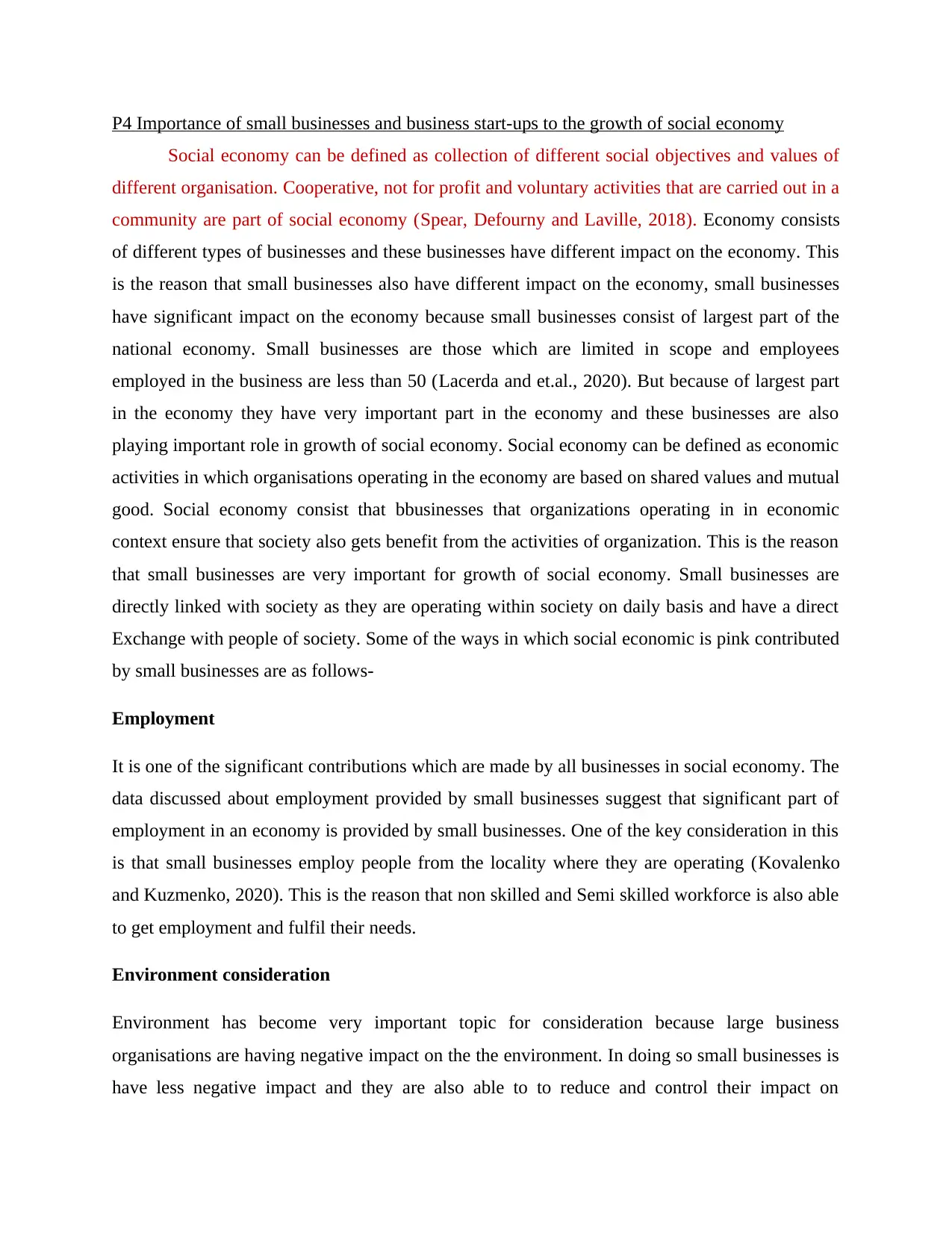
P4 Importance of small businesses and business start-ups to the growth of social economy
Social economy can be defined as collection of different social objectives and values of
different organisation. Cooperative, not for profit and voluntary activities that are carried out in a
community are part of social economy (Spear, Defourny and Laville, 2018). Economy consists
of different types of businesses and these businesses have different impact on the economy. This
is the reason that small businesses also have different impact on the economy, small businesses
have significant impact on the economy because small businesses consist of largest part of the
national economy. Small businesses are those which are limited in scope and employees
employed in the business are less than 50 (Lacerda and et.al., 2020). But because of largest part
in the economy they have very important part in the economy and these businesses are also
playing important role in growth of social economy. Social economy can be defined as economic
activities in which organisations operating in the economy are based on shared values and mutual
good. Social economy consist that bbusinesses that organizations operating in in economic
context ensure that society also gets benefit from the activities of organization. This is the reason
that small businesses are very important for growth of social economy. Small businesses are
directly linked with society as they are operating within society on daily basis and have a direct
Exchange with people of society. Some of the ways in which social economic is pink contributed
by small businesses are as follows-
Employment
It is one of the significant contributions which are made by all businesses in social economy. The
data discussed about employment provided by small businesses suggest that significant part of
employment in an economy is provided by small businesses. One of the key consideration in this
is that small businesses employ people from the locality where they are operating (Kovalenko
and Kuzmenko, 2020). This is the reason that non skilled and Semi skilled workforce is also able
to get employment and fulfil their needs.
Environment consideration
Environment has become very important topic for consideration because large business
organisations are having negative impact on the the environment. In doing so small businesses is
have less negative impact and they are also able to to reduce and control their impact on
Social economy can be defined as collection of different social objectives and values of
different organisation. Cooperative, not for profit and voluntary activities that are carried out in a
community are part of social economy (Spear, Defourny and Laville, 2018). Economy consists
of different types of businesses and these businesses have different impact on the economy. This
is the reason that small businesses also have different impact on the economy, small businesses
have significant impact on the economy because small businesses consist of largest part of the
national economy. Small businesses are those which are limited in scope and employees
employed in the business are less than 50 (Lacerda and et.al., 2020). But because of largest part
in the economy they have very important part in the economy and these businesses are also
playing important role in growth of social economy. Social economy can be defined as economic
activities in which organisations operating in the economy are based on shared values and mutual
good. Social economy consist that bbusinesses that organizations operating in in economic
context ensure that society also gets benefit from the activities of organization. This is the reason
that small businesses are very important for growth of social economy. Small businesses are
directly linked with society as they are operating within society on daily basis and have a direct
Exchange with people of society. Some of the ways in which social economic is pink contributed
by small businesses are as follows-
Employment
It is one of the significant contributions which are made by all businesses in social economy. The
data discussed about employment provided by small businesses suggest that significant part of
employment in an economy is provided by small businesses. One of the key consideration in this
is that small businesses employ people from the locality where they are operating (Kovalenko
and Kuzmenko, 2020). This is the reason that non skilled and Semi skilled workforce is also able
to get employment and fulfil their needs.
Environment consideration
Environment has become very important topic for consideration because large business
organisations are having negative impact on the the environment. In doing so small businesses is
have less negative impact and they are also able to to reduce and control their impact on
Paraphrase This Document
Need a fresh take? Get an instant paraphrase of this document with our AI Paraphraser
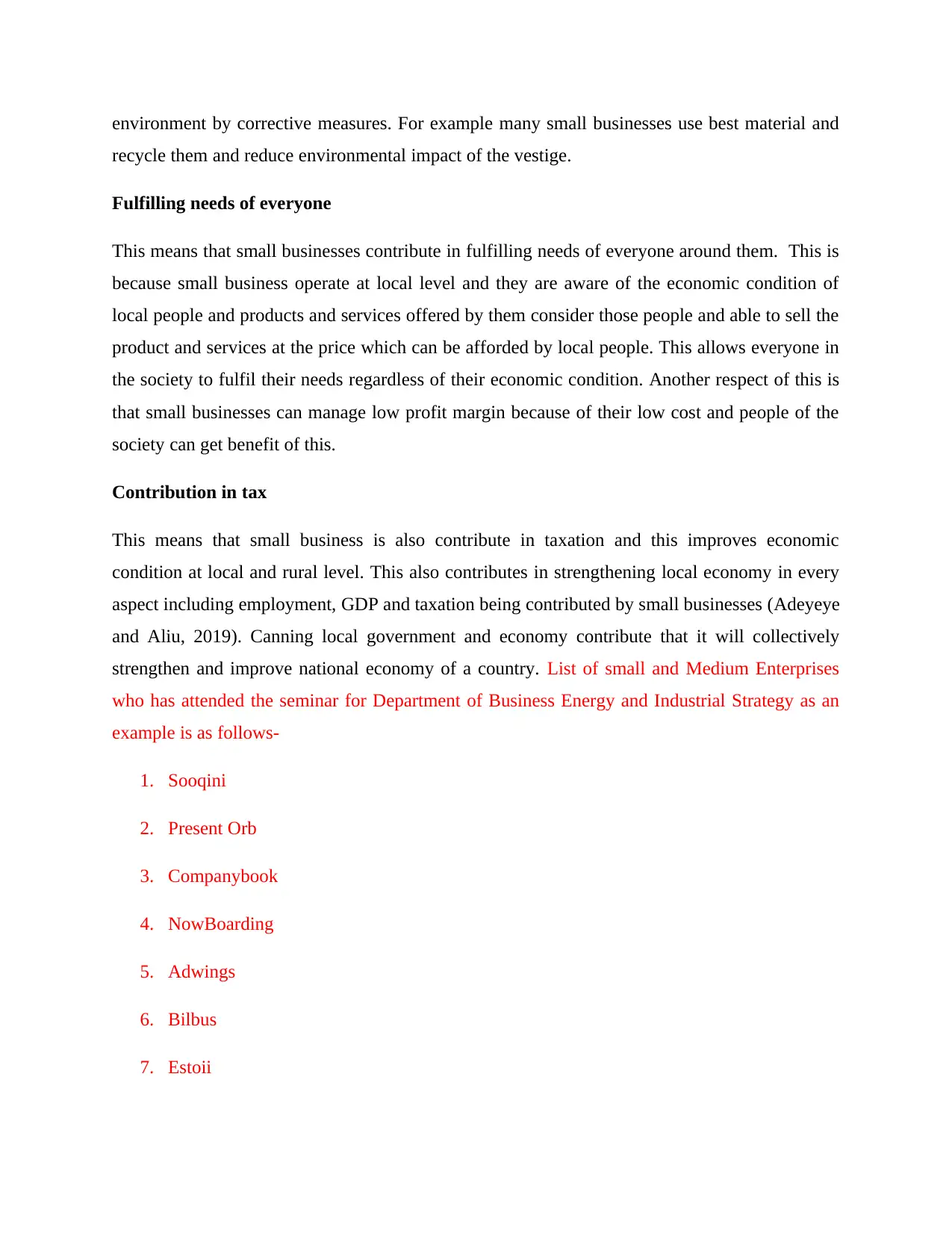
environment by corrective measures. For example many small businesses use best material and
recycle them and reduce environmental impact of the vestige.
Fulfilling needs of everyone
This means that small businesses contribute in fulfilling needs of everyone around them. This is
because small business operate at local level and they are aware of the economic condition of
local people and products and services offered by them consider those people and able to sell the
product and services at the price which can be afforded by local people. This allows everyone in
the society to fulfil their needs regardless of their economic condition. Another respect of this is
that small businesses can manage low profit margin because of their low cost and people of the
society can get benefit of this.
Contribution in tax
This means that small business is also contribute in taxation and this improves economic
condition at local and rural level. This also contributes in strengthening local economy in every
aspect including employment, GDP and taxation being contributed by small businesses (Adeyeye
and Aliu, 2019). Canning local government and economy contribute that it will collectively
strengthen and improve national economy of a country. List of small and Medium Enterprises
who has attended the seminar for Department of Business Energy and Industrial Strategy as an
example is as follows-
1. Sooqini
2. Present Orb
3. Companybook
4. NowBoarding
5. Adwings
6. Bilbus
7. Estoii
recycle them and reduce environmental impact of the vestige.
Fulfilling needs of everyone
This means that small businesses contribute in fulfilling needs of everyone around them. This is
because small business operate at local level and they are aware of the economic condition of
local people and products and services offered by them consider those people and able to sell the
product and services at the price which can be afforded by local people. This allows everyone in
the society to fulfil their needs regardless of their economic condition. Another respect of this is
that small businesses can manage low profit margin because of their low cost and people of the
society can get benefit of this.
Contribution in tax
This means that small business is also contribute in taxation and this improves economic
condition at local and rural level. This also contributes in strengthening local economy in every
aspect including employment, GDP and taxation being contributed by small businesses (Adeyeye
and Aliu, 2019). Canning local government and economy contribute that it will collectively
strengthen and improve national economy of a country. List of small and Medium Enterprises
who has attended the seminar for Department of Business Energy and Industrial Strategy as an
example is as follows-
1. Sooqini
2. Present Orb
3. Companybook
4. NowBoarding
5. Adwings
6. Bilbus
7. Estoii
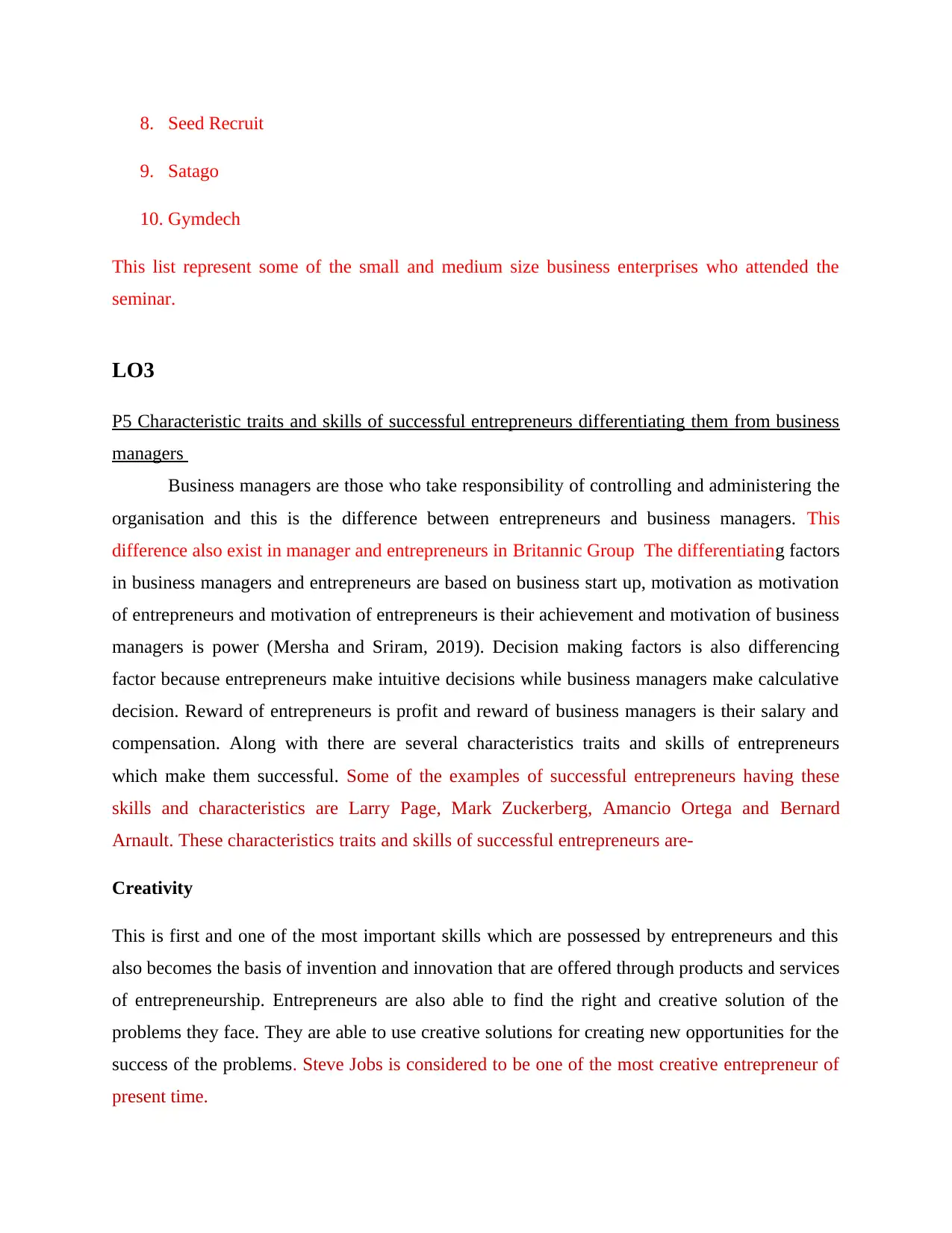
8. Seed Recruit
9. Satago
10. Gymdech
This list represent some of the small and medium size business enterprises who attended the
seminar.
LO3
P5 Characteristic traits and skills of successful entrepreneurs differentiating them from business
managers
Business managers are those who take responsibility of controlling and administering the
organisation and this is the difference between entrepreneurs and business managers. This
difference also exist in manager and entrepreneurs in Britannic Group The differentiating factors
in business managers and entrepreneurs are based on business start up, motivation as motivation
of entrepreneurs and motivation of entrepreneurs is their achievement and motivation of business
managers is power (Mersha and Sriram, 2019). Decision making factors is also differencing
factor because entrepreneurs make intuitive decisions while business managers make calculative
decision. Reward of entrepreneurs is profit and reward of business managers is their salary and
compensation. Along with there are several characteristics traits and skills of entrepreneurs
which make them successful. Some of the examples of successful entrepreneurs having these
skills and characteristics are Larry Page, Mark Zuckerberg, Amancio Ortega and Bernard
Arnault. These characteristics traits and skills of successful entrepreneurs are-
Creativity
This is first and one of the most important skills which are possessed by entrepreneurs and this
also becomes the basis of invention and innovation that are offered through products and services
of entrepreneurship. Entrepreneurs are also able to find the right and creative solution of the
problems they face. They are able to use creative solutions for creating new opportunities for the
success of the problems. Steve Jobs is considered to be one of the most creative entrepreneur of
present time.
9. Satago
10. Gymdech
This list represent some of the small and medium size business enterprises who attended the
seminar.
LO3
P5 Characteristic traits and skills of successful entrepreneurs differentiating them from business
managers
Business managers are those who take responsibility of controlling and administering the
organisation and this is the difference between entrepreneurs and business managers. This
difference also exist in manager and entrepreneurs in Britannic Group The differentiating factors
in business managers and entrepreneurs are based on business start up, motivation as motivation
of entrepreneurs and motivation of entrepreneurs is their achievement and motivation of business
managers is power (Mersha and Sriram, 2019). Decision making factors is also differencing
factor because entrepreneurs make intuitive decisions while business managers make calculative
decision. Reward of entrepreneurs is profit and reward of business managers is their salary and
compensation. Along with there are several characteristics traits and skills of entrepreneurs
which make them successful. Some of the examples of successful entrepreneurs having these
skills and characteristics are Larry Page, Mark Zuckerberg, Amancio Ortega and Bernard
Arnault. These characteristics traits and skills of successful entrepreneurs are-
Creativity
This is first and one of the most important skills which are possessed by entrepreneurs and this
also becomes the basis of invention and innovation that are offered through products and services
of entrepreneurship. Entrepreneurs are also able to find the right and creative solution of the
problems they face. They are able to use creative solutions for creating new opportunities for the
success of the problems. Steve Jobs is considered to be one of the most creative entrepreneur of
present time.
⊘ This is a preview!⊘
Do you want full access?
Subscribe today to unlock all pages.

Trusted by 1+ million students worldwide
1 out of 21
Related Documents
Your All-in-One AI-Powered Toolkit for Academic Success.
+13062052269
info@desklib.com
Available 24*7 on WhatsApp / Email
![[object Object]](/_next/static/media/star-bottom.7253800d.svg)
Unlock your academic potential
Copyright © 2020–2026 A2Z Services. All Rights Reserved. Developed and managed by ZUCOL.



